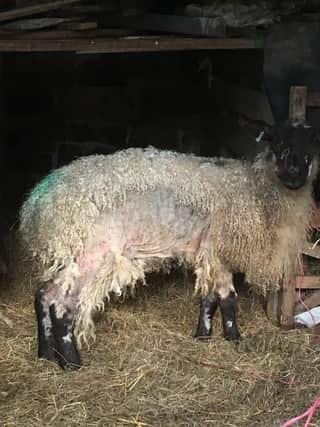FARMING: Uniting against the ‘nasty wee beasty’


One farmer describes this parasite as a “nasty wee beasty” and this is a good description for this devastating little mite. Sheep scab is caused by a microscopic organism known as Psoroptes ovis and has a preference for living on sheep but will reside off the host in organic material for up to 17 days. The main sign of infection is itchiness. In the first stages of disease the sheep may not show many signs and infestation can go unnoticed however over the course of a month the itching will gradually get worse. Sheep will be observed rubbing against fences, nibbling or biting at their skin and pulling wool from the fleece. Once the infestation is well established, sheep will be seen with large areas of fleece missing and their skin will become inflamed and scabby.
Left untreated the flock will become obsessed with scratching, leading to weight loss and potentially death. Diagnosis is of paramount importance as other skin diseases such as lice can cause similar signs but require a different treatment.
Advertisement
Hide AdAdvertisement
Hide AdSo, sheep scab is certainly a nasty wee beasty. In Scotland, the disease is still notifiable, meaning that the authorities must be informed if a flock is suspected of carrying the mite. However, south of the border sheep scab is no longer notifiable and since deregulation we have seen a steady rise in its diagnosis.
Once again, an outbreak of sheep scab is present in Northumberland with the mite being identified on several farms north of Alnwick. In order to control the beast, a coordinated approach is required.
The mite will happily live off its preferred host for up to 17 days and can be carried around in a small piece of organic material during this time. So, vehicles, clothing, dogs, and humans are all unwitting spreaders. This presents a particular challenge to the vets tasked with eradicating sheep scab from an area. Local shepherds, farmers and vets must work closely together to ensure all the sheep in an area are treated with an effective chemical in as close a time frame as possible I’m pleased to report that is exactly what is happening in the affected area. Vets from Alnorthumbria, Black Sheep, Cheviot and Morris and Plumley have got their heads together with all the sheep farmers in the area to ensure that all the local sheep will be treated effectively from now until the end of March. Furthermore, a pledge to repeat this process in the late summer to early autumn has been made so hopefully this will stamp out the “nasty wee beasty”.
Please do not hesitate to contact your vet if you are a sheep keeper with itchy sheep or are in the area north of Alnwick and have not yet been informed of the treatment plan.